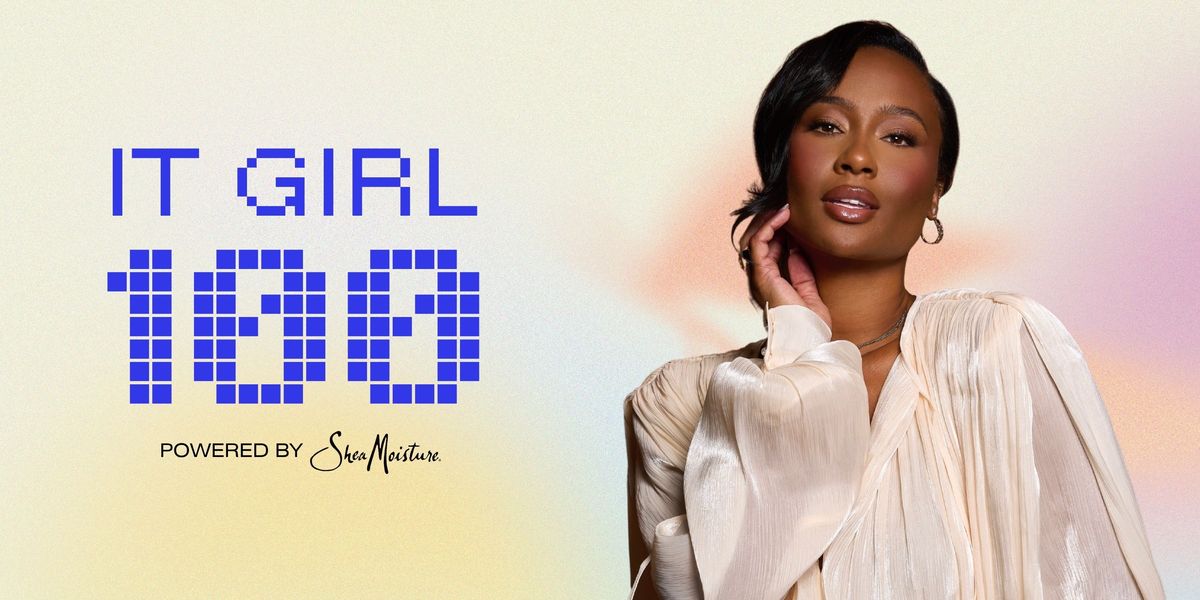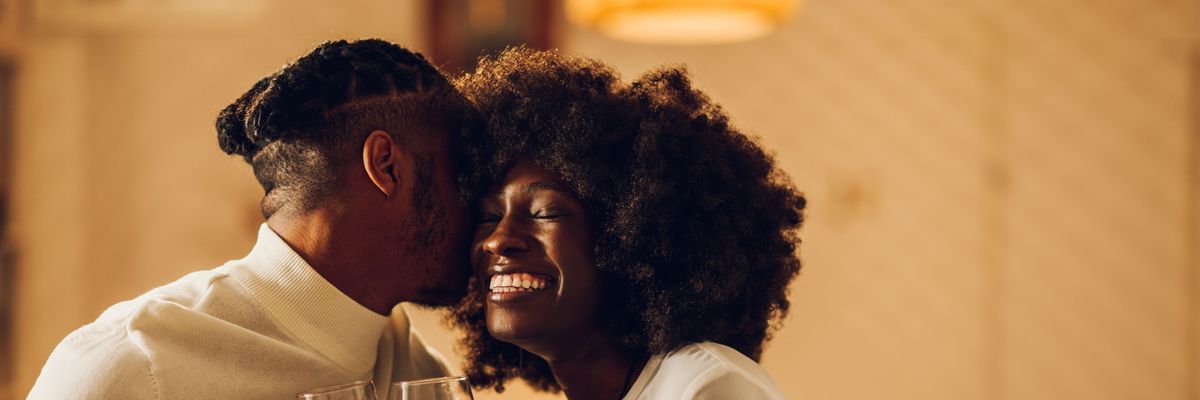How Aala Marra Overcame Her Autoimmune Disease By Taking Her Healing Into Her Own Hands

Aala Marra's glow is enough to illuminate an entire room, which makes it easy to spot the autoimmune survivor amid the buzz at lower Manhattan's Ludlow House. Her radiant skin, framed by natural curls, is a testament to her commitment to wellness and a nod to her ability to flip the darkest chapter of her life into light.
It's hard to imagine that nearly four years ago, the vibrant spirit who has amassed and inspired thousands of followers, was at the mercy of a debilitating disease. It started with drastic hair loss. Merely two months before ringing in her 23rd birthday, Aala woke up to half of her waist-length hair on the floor. "I thought I was dreaming at first," she tells xoNecole over lunch. "It was absolutely traumatizing."
The dismal moment prompted an instant trip to the doctor but left her with unanswered questions. As she bounced from one medical professional to the next, Aala's symptoms took a grim turn and her mental health followed suit. Working for an investment bank at the time, she crumbled under the stress of Wall Street and the weight of eczema, migraines, and muscle spasms.
It wasn't until her last doctor visit that she discovered she was battling an autoimmune disease, which heavily mirrored lupus yet had no name of its own. With the revelation also came the reality that the medication proposed to her would put her at risk for additional symptoms and, ultimately, would not address the source of her failing health. "At that point in my life, I was in such a dark place. I couldn't afford any more symptoms financially, emotionally, and physically," she stresses. "I respectfully declined the offer to get medicated some more, and I walked out with no plan."
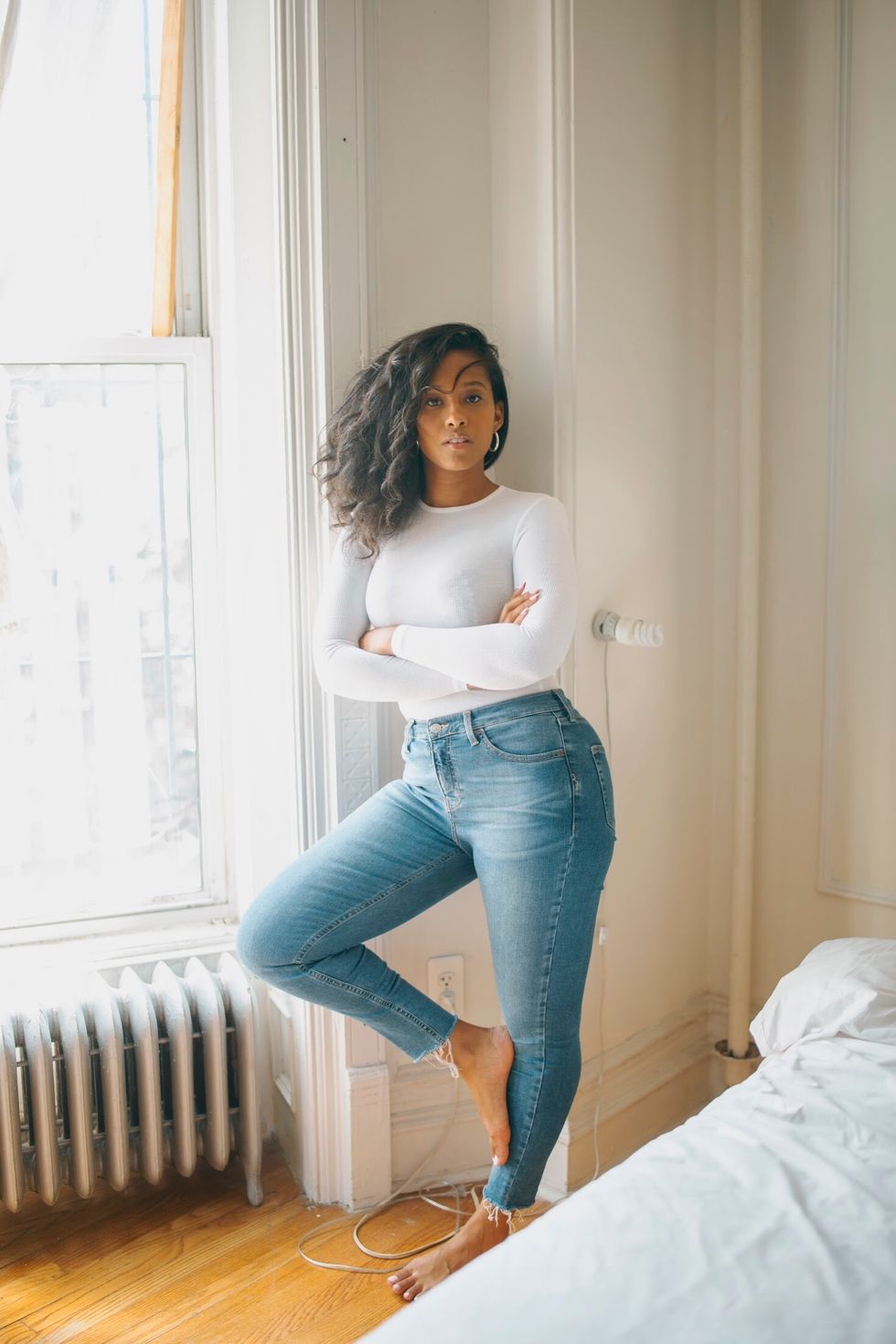
Courtesy of Aala Marra / Kofi Dua
"At that point in my life, I was in such a dark place. I couldn't afford any more symptoms financially, emotionally, and physically."
Shortly after, a conversation she had with a woman who raved about her journey to wellness with the late herbalist Dr. Sebi earlier in the year sprang to mind. While Aala didn't seek treatment from the Honduran healer, the testimonial swelled her desire to do research on herbs, gut health, and the ancient African diet.
The Brooklyn resident went on to craft a cleanse grounded in what she learned, increasing her water intake and eliminating inflammatory foods from her diet in the process. The results were dramatic. Her symptoms not only reversed within two weeks but were completely erased three months later. "I wasn't even back to normal. I was glowing. I was energetic," she reflects as tears well up in her eyes. "It never gets old."
Though fiercely private at the time, Aala couldn't resist the urge to share her story in hopes that others would find solace in her triumph. "I knew that there were people who could identify with it or it could at least reach people that needed to hear it, and it's just my truth. I wanted to celebrate it and definitely advocate for wellness and health and destigmatize it," she explains.
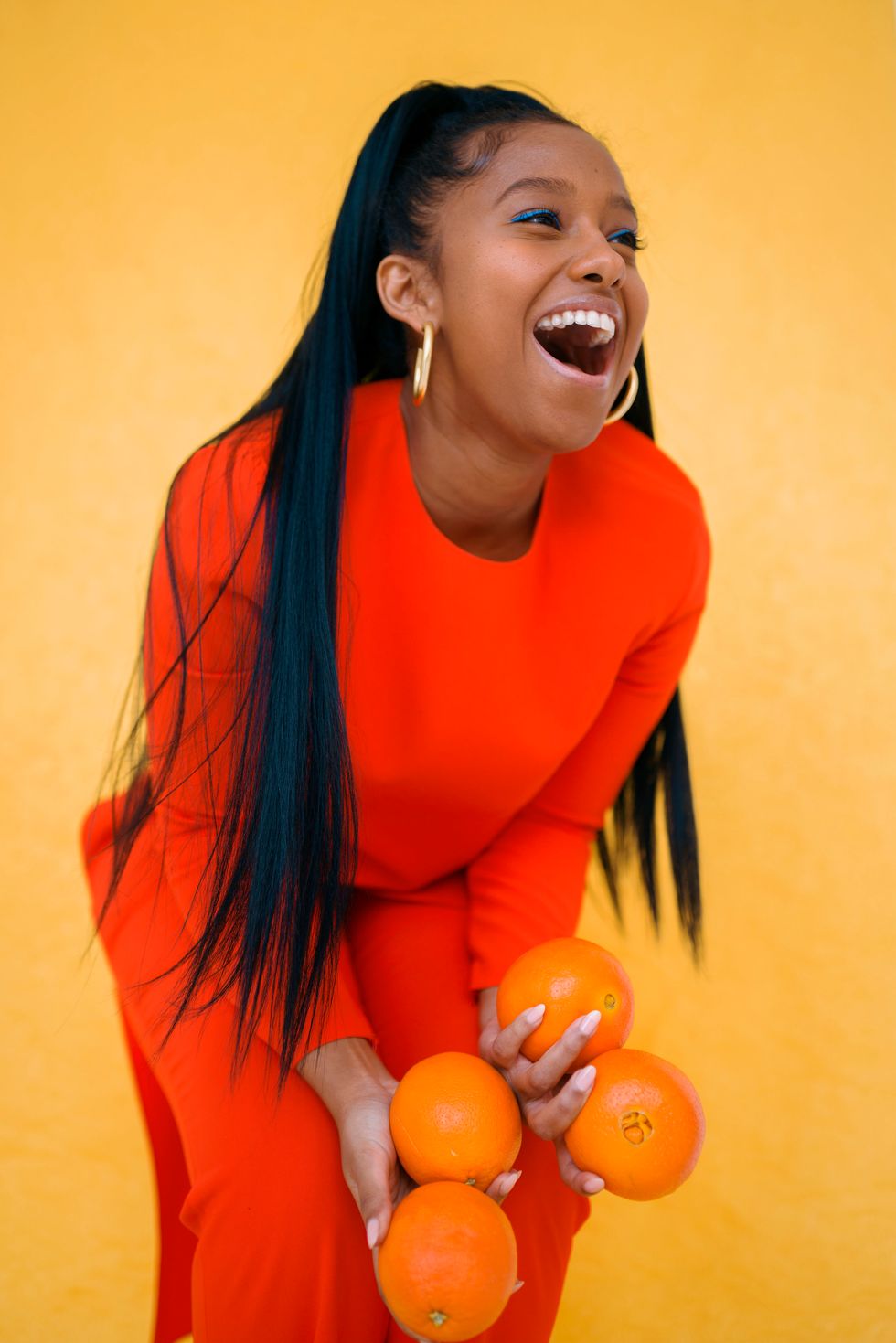
Courtesy of Aala Marra / Kofi Dua
"I knew that there were people who could identify with it or it could at least reach people that needed to hear it, and it's just my truth. I wanted to celebrate it and definitely advocate for wellness and health and destigmatize it."
In less than two years, she drew thousands of eyes to her Instagram page. "It was super organic," she points out. "It was all in response to what people wanted." After revisiting her cleanse in November 2017, Aala's followers tagged along. When they asked for recipes she infused into her diet while recovering from her disease, she released Aala Marra's Cleansing Cookbook two months later. As supporters requested an even deeper look into her journey to wellness from start to present day, she granted them access through her September title I Am the Cure...And So Are You.
The health enthusiast, who also teaches an online course on her cleanse, hasn't limited her influence to the virtual world either. While returning to New York from Coachella last spring, she took an impromptu detour to Kansas City to directly work with a follower named Keyonna who couldn't see past her multiple sclerosis. Within three days, the ladies took a trip to the grocery store, revamped her kitchen, and prepared meals together. Once strangers, Aala gushes that the two are now friends and have both marveled at Keyonna's restored energy and dissipating pain since then. That summer, she hit the road once again to connect with three more women whose lives have been impacted by her cleanse. "It's been the gift that keeps on giving," she muses. "I get DMs, emails, and messages every single day."
The Sudan native credits her affinity to uplift others to her father, who dedicated his life to building schools, wells, and clinics in sub-Saharan Africa. "I've always known this, but I just care about people. That's the energy that I grew up in," she says.
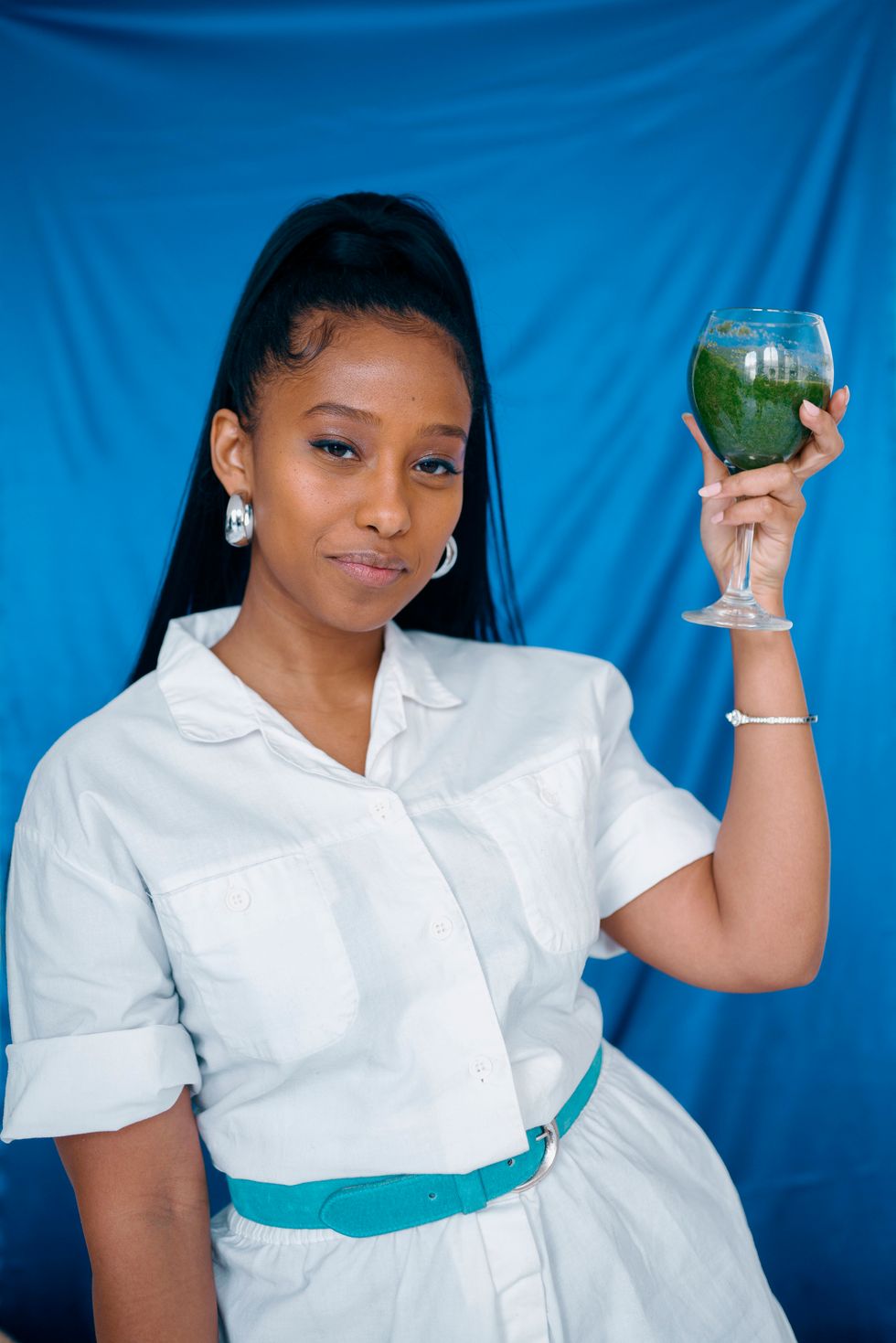
Courtesy of Aala Marra / Kofi Dua
"I've always known this, but I just care about people. That's the energy that I grew up in."
It's in that spirit that the impact entrepreneur has designed her lifestyle healthcare brand aalaCare. Launched this April, the wellness resource strives to support people in their surviving moments and usher them into a thriving reality. It's a movement that starts with a six-week master healing course and will later expand to include a virtual cooking program, live events, and products intended to spark change on a community level.
"I'm very different from people in the wellness industry," Aala emphasizes. "While it's an amazing industry, there's a privileged tone to it, and a lot of people that need wellness don't have access to it."
Her platform aims to combat just that by creating a space for people of color--especially black women--to enhance their lifestyles holistically. "We're not taught to go within," she says. "When I noticed that I wasn't feeling well, everything that I was seeking in order to figure out what was going on was external."
Now on the other side of a disease that once threatened to end her life, Aala has come to know that health is more than the physical. It's also mental and emotional. "There was a traumatic event that happened in a personal relationship of mine in February [2015]. In July [2015], I developed my first symptom. There's absolutely no coincidence," she maintains. "I was eating a certain way since the beginning of time. Why was it then that my body decided to break?"
While she's not one to push her example on others, Aala cautions not to succumb to the idea of waiting for an optimal, or even distressing, time to make better life choices. "The only perfect time is now. You're about it or you're not about it," she says.
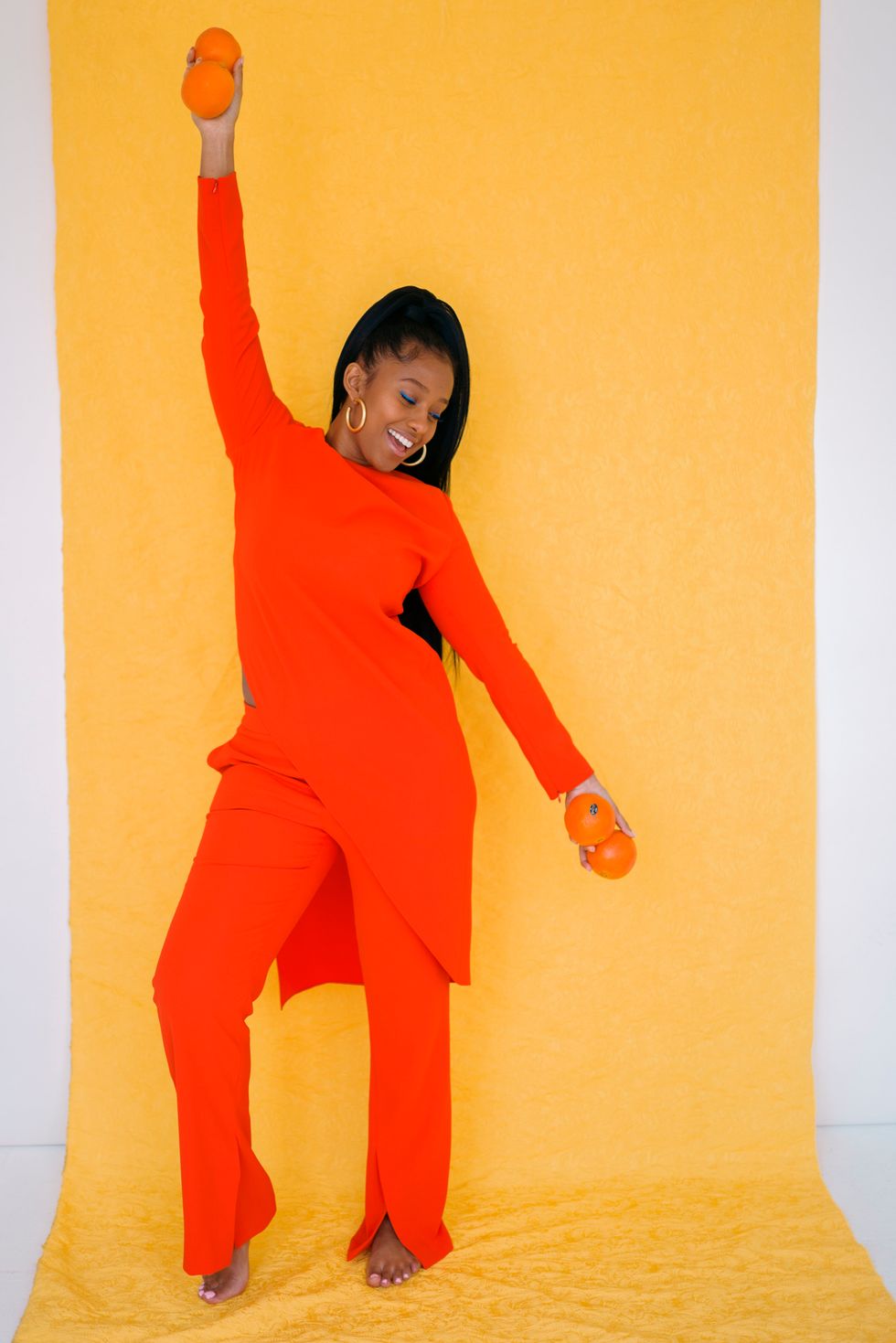
Courtesy of Aala Marra / Kofi Dua
"The only perfect time is now. You're about it or you're not about it."
No longer chained to the pain of her past, Aala emits hope to those seeking to reclaim their health simply by owning hers out loud. Humbled by the lives she touched and those she will continue to inspire along the way, she walks in gratitude knowing that what she suffered was not in vain. "I'm never out here to force anyone to do anything. I just share my truth," she closes. "Knowing that my story literally transforms people's lives really shows the power of authenticity."
For more of Aala, follow her on Instagram.
Originally published on April 29, 2019
All images courtesy of Aala Marra
Exclusive: Viral It Girl Kayla Nicole Is Reclaiming The Mic—And The Narrative
It’s nice to have a podcast when you’re constantly trending online. One week after setting timelines ablaze on Halloween, Kayla Nicole released an episode of her Dear Media pop culture podcast, The Pre-Game, where she took listeners behind the scenes of her viral costume.
The 34-year-old had been torn between dressing up as Beyoncé or Toni Braxton, she says in the episode. She couldn’t decide which version of Bey she’d be, though. Two days before the holiday, she locked in her choice, filming a short recreation of Braxton’s “He Wasn’t Man Enough for Me” music video that has since garnered nearly 6.5M views on TikTok.
Kayla Nicole says she wore a dress that was once worn by Braxton herself for the Halloween costume. “It’s not a secret Toni is more on the petite side. I’m obsessed with all 5’2” of her,” she tells xoNecole via email. “But I’m 5’10'' and not missing any meals, honey, so to my surprise, when I got the dress and it actually fit, I knew it was destiny.”
The episode was the perfect way for the multihyphenate to take control of her own narrative. By addressing the viral moment on her own platform, she was able to stir the conversation and keep the focus on her adoration for Braxton, an artist she says she grew up listening to and who still makes her most-played playlist every year. Elsewhere, she likely would’ve received questions about whether or not the costume was a subliminal aimed at her ex-boyfriend and his pop star fiancée. “I think that people will try to project their own narratives, right?” she said, hinting at this in the episode. “But, for me personally – I think it’s very important to say this in this moment – I’m not in the business of tearing other women down. I’m in the business of celebrating them.”
Kayla Nicole is among xoNecole’s It Girl 100 Class of 2025, powered by SheaMoisture, recognized in the Viral Voices category for her work in media and the trends she sets on our timelines, all while prioritizing her own mental and physical health. As she puts it: “Yes, I’m curating conversations on my podcast The Pre-Game, and cultivating community with my wellness brand Tribe Therepē.”
Despite being the frequent topic of conversation online, Kayla Nicole says she’s learning to take advantage of her growing social media platform without becoming consumed by it. “I refuse to let the internet consume me. It’s supposed to be a resource and tool for connection, so if it becomes anything beyond that I will log out,” she says.
On The Pre-Game, which launched earlier this year, she has positioned herself as listeners “homegirl.” “There’s definitely a delicate dance between being genuine and oversharing, and I’ve had to learn that the hard way. Now I share from a place of reflection, not reaction,” she says. “If it can help someone feel seen or less alone, I’ll talk about it within reason. But I’ve certainly learned to protect parts of my life that I cherish most. I share what serves connection but doesn’t cost me peace.
"I refuse to let the internet consume me. It’s supposed to be a resource and tool for connection, so if it becomes anything beyond that I will log out."

Credit: Malcolm Roberson
Throughout each episode, she sips a cocktail and addresses trending topics (even when they involve herself). It’s a platform the Pepperdine University alumnus has been preparing to have since she graduated with a degree in broadcast journalism, with a concentration in political science.
“I just knew I was going to end up on a local news network at the head anchor table, breaking high speed chases, and tossing it to the weather girl,” she says. Instead, she ended up working as an assistant at TMZ before covering sports as a freelance reporter. (She’s said she didn’t work for ESPN, despite previous reports saying otherwise.) The Pre-Game combines her love for pop culture and sports in a way that once felt inaccessible to her in traditional media.
She’s not just a podcaster, though. When she’s not behind the mic, taking acting classes or making her New York Fashion Week debut, Kayla Nicole is also busy elevating her wellness brand Tribe Therepē, where she shares her workouts and the workout equipment that helps her look chic while staying fit. She says the brand will add apparel to its line up in early 2026.
“Tribe Therepē has evolved into exactly what I have always envisioned. A community of women who care about being fit not just for the aesthetic, but for their mental and emotional well-being too. It’s grounded. It’s feminine. It’s strong,” she says. “And honestly, it's a reflection of where I am in my life right now. I feel so damn good - mentally, emotionally, and physically. And I am grateful to be in a space where I can pour that love and light back into the community that continues to pour into me.”
Tap into the full It Girl 100 Class of 2025 and meet all the women changing game this year and beyond. See the full list here.
Featured image by Malcolm Roberson
This Is How To Keep 'Holiday Season Stress' From Infecting Your Relationship
Hmph. Maybe it’s just me, but it seems like there is something really weird happening in the fall season air (because winter doesn’t officially begin until December 21) that cuddle season is in full swing while break-up season is as well. In fact, did you know that break-ups are so popular during the holiday season that December 11 is deemed Break-Up Day?
The reasons why relationships shift around this time vary; however, I did both roll my eyes and chuckle when I read that a very popular one is because it’s an easy way to get out of getting one’s significant other a Christmas present. SMDH.
Anyway, I personally think that the less shallow folks out here may contemplate calling things “quits” or they at least distance themselves a bit from their partner (and what I’m referring to is serious relationships) due to all of the stress and strain that oftentimes comes with the holidays whether it be financial, familial, due to their tight schedules or something else.
Listen, I would hate for you and your man to miss the fun and happiness of experiencing this time of year, all because you are so overwhelmed or irritated that you can’t really enjoy it. That’s why I have a few practical tips for how to avoid allowing the typical holiday season stress from INFECTING your relationship.
Manage Your Expectations
 Giphy
GiphyUnmanaged expectations. If there is a main reason why the holiday season tends to be so stress-filled for so many people, I’d bet good money that this is the cause. And when you’re in a long-term relationship, expectations can manifest themselves in all sorts of cryptic and/or unexpected ways. You might have relatives who assume that you are going to be with them for Thanksgiving or Christmas when you have other plans in mind. You might be thinking that you are going to spend one amount for presents while your man is thinking something totally different. When it comes to scheduling, your signals may be crossed.
And you know what? To all of these scenarios, this is where clear and consistent communication come in. Don’t assume anything. Don’t dictate anything either. From now until New Year’s, mutually decide to check in once a week, just to make sure that you are both on the same page as it relates to the holidays and what you both are thinking will come along with it. The less blindsided you both feel, the less stressed out you will be. Trust me on this.
Set (and Keep) a Budget
 Giphy
GiphyOkay, so I read that last year, 36 percent of Americans incurred some type of holiday-related debt. Hmph. Last year, there was still some sense of normalcy in this country, chile, so I can only imagine what finances are gonna look like over the next several weeks. That said, since I don’t know a lot of people who don’t find being broke stressful, make sure that you and your bae set a budget and then stick to it this year — no ifs, ands or buts.
Because really, y’all — it doesn’t make sense to deplete savings and/or max out credit cards for a few days of giggles only to be damn near losing your mind because you don’t know how to make ends meet come Dr. Martin Luther King, Jr. Day.
And by the way, this tip doesn’t just speak to things like food and gifts; I also mean travel. If it doesn’t make a ton of sense (or cents) to be all over the place this year — DON’T BE.
Keep Matthew 5:37 at the Forefront
 Giphy
GiphyIf off the top of your head, you don’t know what Matthew 5:37 says, no worries, here ya go: “But let your ‘Yes’ be ‘Yes,’ and your ‘No,’ ‘No.’ For whatever is more than these is from the evil one.” That verse right there? Oh, it’s a boundaries lifesaver! I say that because do you see “maybe” or “I’ll think about it” in there? Nope. LOL. It says that you should tell people “yes” or “no” and leave it at that — and that complements Anne Lamott’s quote, “’No’ is a complete sentence” impeccably well. Yeah, you’ve got to remember that anything beyond a yes or no to a request is privileged information; you don’t owe anyone details or an explanation.
Besides, if you are really honest with yourself, when someone asks you something and you give a “Umm, let me think about it” kind of reply, more times than not, you already know what your answer is going to be — so why not let you both off of the hook? Give your response. Commit to that. And let everyone (including yourself) get on with their lives and schedules.
I promise you that when it comes to those holiday parties, you are pissing more folks off by not RSVP’ing or doing so and not showing up than just saying, “Thank you but not this year” off the rip.
Remember That Your Personal Space Is Privilege Not a Right
 Giphy
GiphyA friend of mine recently bought a new house and invited me over to come see it. He’s a single man with no children, so as I was taking in all of the space that he had, especially as I walked through his finished basement, I joked about relatives coming to live with him. “Hell no” and “absolutely not” were pretty much his immediate responses as he went on to say that some folks even had the nerve to be offended when he told them that he had no intentions on taking DNA in.
Ain’t it wild how people think that your stuff is their right? And yes, that brings me to my next point. Your home is your sanctuary space. If you want to host folks this year — cool. If not, ALSO COOL. Please don’t let folks (family included) guilt you into how they want you to act or even into what they would do if the shoe was on the other foot. You are not them — and as one of my favorite quotes states, “If two people were exactly alike, one of them would be unnecessary.” (A man by the name Larry Dixon said that.)
Hell, my friends? They know that I am good for sending them random things that they need or even want all throughout the year. Coming over to hang out at my pace, though. Uh-uh. Chalk it up to being a card-carrying member of the ambivert club yet I like keeping my living space personal — and I sleep like a baby, each and every night, for feeling that way.
Always remember that your space, your time, your resources, your energy and shoot, yourself period (including your relationship), are all things that are your own. You get to choose how, when and why you want to share them. The holiday season is certainly no exception.
Cultivate Some “You Two Only” Traditions
 Giphy
GiphyIt’s not uncommon for some couples to hit me up after the holiday season to “detox.” Sometimes it’s due to the financial drama (and sometimes trauma) that they experienced. Sometimes it’s because they allowed their relatives (especially in-laws) to get more into their personal business than they should’ve. More than anything, though, it tends to be because they didn’t get enough quality time together and so ended up feeling “disconnected.”
Please don’t let that happen. Listen, I’m not even a holidays kind of woman and yet, I will absolutely sit myself down with some hot chocolate and chocolate chip cookies to enjoy a Hallmark holiday film or two. Aside from the fact that most of them are lighthearted and sweet, I also like that they usually focus on couples loving on each other amidst all of the holiday beauty and ambiance — which is something that all couples should set aside some time to do.
Maybe it’s a vacation. Maybe it’s a staycation. Or maybe it’s my personal favorite, A SEXCATION. Whether it’s for a few days, the weekend or even overnight — don’t you let the holidays go by without setting aside time for you and your man to celebrate one another. Don’t you dare (check out “Are You Ready To Have Some Very Merry 'Christmas Sex'?”).
GET. SOME. REST.
 Giphy
GiphyI once read that 8 out of 10 people get stressed out over the holidays and 3 out of 10 lose sleep during to it — and when you’re stress-filled and sleep-deprived, that can absolutely lead to hypersensitivity, making mountains out of molehills and even not being in the mood for sex.
Your relationship can’t afford to go through any of this, so definitely make sure to prioritize rest. I don’t care how unrealistic it might seem during this time, sleep should never be seen as a luxury; it will always and forever be a great necessity.
That said, try to get no less than six hours of shut-eye in (check out “6 Fascinating Ways Sex And Sleep Definitely Go Hand In Hand”) and even ask your bae to take a nap with you sometimes (check out “Wanna Have Some Next-Level Sex? Take A Nap, Sis.”). Not only will sleep help to restore your mind, body and spirit but, when it’s with your partner, it’s an act of intimacy that can make you both feel super connected, even in the midst of what might feel like chaos.
___
Holiday season stress is real. Still, never give it the permission or power to throw your relationship off. Put you and your man first and let the holidays be what they are gonna be, chile.
Let’s make things inbox official! Sign up for the xoNecole newsletter for love, wellness, career, and exclusive content delivered straight to your inbox.
Featured image by Shutterstock








